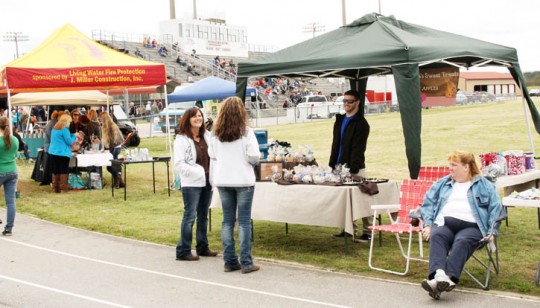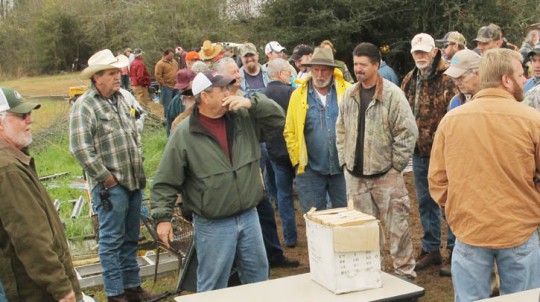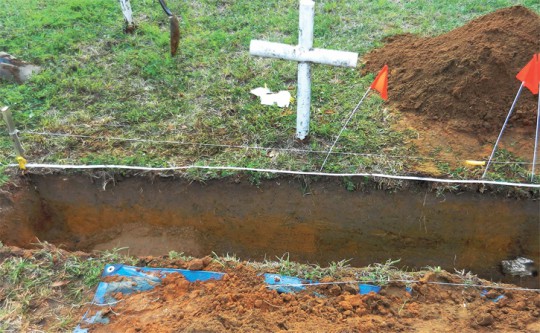Blue Jacket Jamboree Set For March 7; Vendors Still Needed
February 26, 2015
The annual Blue Jacket Jamboree is returning to Northview High School on Saturday, March 7 with free admission.
There are dozens of confirmed vendors ranging from Scentsy to wooden birdhouses, wooden crafts, wreaths, jewelry and more. A kids area will include lots of carnival games, pony rides, bounce house and an obstacle course. Entertainment will included Shane Harrell and the Major Moves band, Northview student Colby Flurnoy, and other local talent.
Interested craft vendors should contact Linda Till at (850) 572-1076 or Pam Kleinatland at (850) 712-6267. Food vendors should contact Kleinatland or Angus Brewton at (850) 256-5831.
The Blue Jacket Jamboree will be held on the campus of Northview High School from 10 a.m. until 4 p.m. on March 7.
NorthEscambia.com file photo, click to enlarge.
Annual Walnut Hill Ruritan Farm Auction Is Saturday
February 26, 2015
The 41st Annual Walnut Hill Ruritan Club Farm Equipment Auction will be held this Saturday, February 28 beginning at 9:30 a.m.
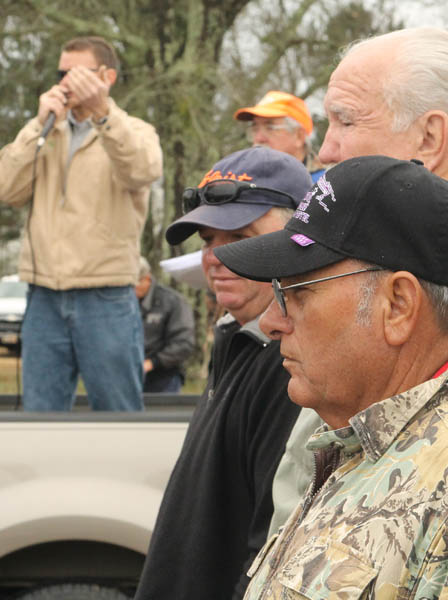 The auction includes not only farm equipment, but also household items like tools and small equipment, lawn and garden items, antiques and more. Items can be received Thursday or Friday. A $5 lot fee will be charged. Must be present to “no sale” items.
The auction includes not only farm equipment, but also household items like tools and small equipment, lawn and garden items, antiques and more. Items can be received Thursday or Friday. A $5 lot fee will be charged. Must be present to “no sale” items.
Settlement must be made the day of the sale; unknown buyers must have cash, cashier’s check, major credit card, or a letter of credit from their bank. Items must within 24 hours.
Concessions will be available all day from the Ruritan Club.
The sale will be located at the Walnut Hill Community Center on Highway 97 just north of Ernest Ward Middle School.
For more information or consignments, call (850) 327-4479 or (850) 327-4318.
Pictured: Hundreds attended a previous Walnut Hill Ruritan Club farm equipment auction in Walnut Hill. NorthEscambia.com file photos, click to enlarge.
As Poarch Creeks Push For North Escambia Gaming, Florida Focus Is On Seminoles
February 26, 2015
As the Poarch Band of Creek Indians push Gov. Rick Scott for a gaming compact and a possible casino in North Escambia [read more], most of the attention on gaming in Florida is focused on a gaming compact with the Seminoles. Dara Kam reports….
A high-stakes deal with the Seminole Tribe set to expire this summer has lawmakers, pari-mutuel operators and out-of-state casinos wrangling over who gets what as the Legislature is once again poised to consider thorny gambling issues during the session that begins Tuesday.
A lucrative portion of an agreement inked by the state and the tribe five years ago — and $116 million a year that goes with it — giving the Seminoles exclusive rights to offer banked card games such as blackjack will expire in mid-July. That is putting pressure on lawmakers, who’ve been leery until now to pass any gaming legislation despite intense pressure from in-state and out-of-state gambling operators.
 But the deadline also gives the Legislature the upper hand when negotiating with the tribe, at least according to Republican leaders who have pointedly omitted the Seminole’s cash from early budget plans for next year.
But the deadline also gives the Legislature the upper hand when negotiating with the tribe, at least according to Republican leaders who have pointedly omitted the Seminole’s cash from early budget plans for next year.
Senate President Andy Gardiner, R-Orlando, has repeatedly said he would be more than fine if the card games went away. Gardiner’s district lies in the shadow of gambling expansion-loathing Disney World, and he is closely linked with the Florida Chamber of Commerce, another gambling foe.
Gardiner has tapped Senate Majority Leader Bill Galvano, the Legislature’s chief negotiator on the Seminole deal five years ago, to oversee the process again.
Any other gambling legislation is inextricably tied to the future of the banked card games portion of the agreement, known as a compact, according to the Senate leaders.
“Until that issue gets resolved it’s hard to know if the Senate or the House is interested in even doing anything,” Gardiner, R-Orlando, told The News Service of Florida.
Under the existing agreement with the state, the Seminoles agreed to pay a minimum of $1 billion over five years in exchange for exclusive rights to table games at seven of its nine facilities. The deal allows the Seminoles to halt the payments if slot machines exist anywhere outside of Broward and Miami-Dade counties, excluding those operated by other tribes. The tribe can also reduce its payments if South Florida pari-mutuels are allowed to have banked card games, or if slots are authorized at any facilities that weren’t already operating in Broward or Miami-Dade, except for Hialeah Race Track, when the deal was signed in 2010.
“The banked card game component of the compact is the cornerstone of any gaming discussion going forward. But the compact itself does not need to be amended in any way. It will exist for the next 15 years. And there’s a very real possibility that the component containing card games will just self-execute and the tribe will have to remove the cards at the end of 90 days after July,” Galvano, R-Bradenton, said. “I’m not pulling your leg. We thought about that going in.”
When asked about the compact, Gov. Rick Scott’s office offered little insight.
“We will take the time that’s needed to get the best deal for the state,” Scott spokeswoman Jackie Schutz said.
As in the past, the elements of any new pact hinge on the tribe’s exclusive rights to have certain games, even if only in specific geographic areas, and revenue paid to the state. Federal law requires any revenue-sharing agreement with the state to include something of value for the tribe, and the feds have to sign off on any compact struck between Florida and the Seminoles.
But, as Galvano pointed out, the state is now in a very different position than when the original deal was crafted.
Lawmakers at the time were at a slight negotiating disadvantage, in part because then-Gov. Charlie Crist had already signed a deal with the Seminoles, who had already begun offering the card games. The Legislature sued Crist, and the Florida Supreme Court agreed with lawmakers who argued that they should have the final word on any agreement with the tribe.
Faced with the possibility of a drawn-out lawsuit, the Legislature instead reworked the deal.
And, at Florida’s economic nadir, the money pledged by the Seminoles was impossible to ignore.
“The tribe’s position was that we would become very accustomed to the dollars — they are significant, there’s no question about that — and there would be an automatic relationship going forward. The difference is, five years ago, the budget situation was drastic. Our budget was very austere. The negotiating position between the state and the tribe was quite dubious given where the governor had been, given that the cards were already being operated,” Galvano said.
Galvano says the newly installed Senate president isn’t bluffing.
“I don’t think there’s any question that President Gardiner is serious when he says he doesn’t feel compelled to act. I myself don’t feel compelled to act. The provision was inserted as part of a 20-year deal, not as the deal itself,” Galvano said.
Timing may also be on the Legislature’s side.
The deal gives the Seminoles 90 days to wrap up the card games, meaning they would have until mid-October to discontinue the lucrative hands. Because the legislative session begins in January next year, committees will meet in October, giving lawmakers time to quickly approve a new agreement if necessary.
Scott, whose talks with the tribe blew up last year, appears to be looking for the Legislature to re-up or craft a new deal — or let the old one die off.
“I think the governor is prepared to defer to us to the extent necessary to make sure we approach it as a unified front,” Galvano said.
Scott last year considered allowing the Seminoles to open more casinos — including one on a 50-acre property owned by the tribe in Fort Pierce — and add roulette and craps to some of their existing facilities. The scuttled deal would also have allowed the tribe to expand its Broward County operations as well as its facility in Brighton. In return, the Seminoles had agreed to a hefty price tag of $2.5 billion over seven years, which is higher than the Seminoles’ current $250 million minimum annual obligation that includes a share of revenues from both slots and cards.
But the proposal was dead on arrival in the Legislature when the potential deal leaked out in the waning days of last year’s session.
Galvano is taking a simpler approach.
“It’s not a time for the tribe to reopen the compact. That’s not what this provision is about. It’s cards or no cards. Once we become comfortable with where that is, that gives us something to gauge a game equity for the existing pari-mutuels against, or resort destination casinos. I’m not saying that any of those are off the table. But you build from there,” he said.
The Seminoles are playing their cards close to the vest. A spokesman would say only that the tribe hopes to seal a new portion of the compact that would benefit both the state and the tribe.
In previous years, the typically more-moderate Senate has signaled willingness to pass gambling legislation, but conservative Republicans have stymied the possibility of getting a measure through the House.
That may change this year, however, under the auspices of new House Speaker Steve Crisafulli, a Merritt Island Republican who said he is “agnostic” on the issue.
Crisafulli appears open to the idea of “destination resorts” — casinos coupled with hotels and/or retail space — that have failed to gain even Senate support in the past.
And, as before, any gambling measure runs the risk of being overloaded with wish lists from industry operators, including pari-mutuels in Broward and Miami-Dade counties that already have slots but want a lower tax rate and card games to better compete with the nearby Seminole Hard Rock Hotel & Casino in Hollywood.
“To me, destination resorts are no different than what Seminoles currently have. I mean, they’re hotels with casinos in them. So I think destination resorts are something that have been labeled, but at the end of the day for Florida it’s about deciding do we want more of a presence of one or two or whatever the conversation is being had on those. Or do you want to just let the Seminoles continue to do what they’re doing and renegotiate a compact with them, clean up some of the pari-mutuel stuff, make it so they have a more competitive environment to operate in and move on,” Crisafulli said in an interview.
In contrast to previous sessions, South Florida pari-mutuels appear to be in agreement regarding a gambling proposal.
With the exception of Gulfstream Park, the seven Broward and Miami-Dade operators are lobbying jointly to lower taxes they pay on slots from 35 percent to 20 percent; the Seminoles’ revenue-sharing agreement amounts to about a 12 percent “tax” rate on earnings. Apart from the card games, the pari-mutuels are also angling for other changes they claim would put them on equal footing with the tribe.
“It goes beyond parity of tax rate and games. We have limited hours. We have limited alcohol. We want a business parity solution,” said Dan Adkins, vice president of Hartman & Tyner, which owns Mardi Gras Casino Florida in Hallandale Beach. “We want the same type of table games and we want all the other conditions.”
Operators outside of South Florida — where voters opened the door for slot machines in 2004, thereby allowing the Seminoles, who, like all Indian tribes, are entitled to the same types of gambling permitted elsewhere in the state — also want “parity,” but with their Miami-Dade and Broward counterparts.
“Currently, there are three licensed thoroughbred horse tracks in Florida, two in South Florida and one in Tampa. Tampa Bay Downs believes we are all part of the same industry and should be treated equally. Tampa Bay Downs respectfully requests parity with South Florida horse tracks. Parity would benefit horsemen with increased purses, patrons with better racing and provide Tampa Bay Downs the opportunity to be competitive both locally and nationally,” Tampa Bay Downs Vice President and General Manager Peter Berube said in an e-mail.
But allowing slot machines outside of Broward and Miami-Dade would stop all of the payments from the Seminoles, something that has kept the Legislature from approving similar proposals despite passage of local referendums supporting slot machines in several counties, including Palm Beach.
Also on the table: the possibility of creating a gambling oversight commission, an idea that appeals to Crisafulli but which, in the past, Scott has opposed.
“The biggest component to me that interests me the most is the regulatory side of it. I believe that Florida being what we know is the third largest gaming state in the country should be focused first and foremost on the regulatory component of gaming by having some sort of commission in place that regulates this industry versus (regulation by) the Department of Business and Professional Regulation,” he said.
Getting the support of the industry and enough legislators to pass a gambling bill will be “an enormous, gargantuan lift,” said House Majority Leader Dana Young, a Tampa Republican in charge of the issue in the House.
“People talk about three-dimensional chess. This is a Rubik’s cube. Will we be able to come up with something that addresses the wants of everyone? That’s highly unlikely. Can we come up with something that’s in the best interest of Florida that can pass? Maybe. But that’s a tall order,” she said.
by Dara Kam, The News Service of Florida
Nelson Seeks Federal Probe Of Dozier School For Boys
February 26, 2015
U.S. Sen. Bill Nelson, D-Fla., has asked the U.S. Justice Department to launch an investigation into the shuttered Arthur G. Dozier School for Boys in the Jackson County town of Marianna.
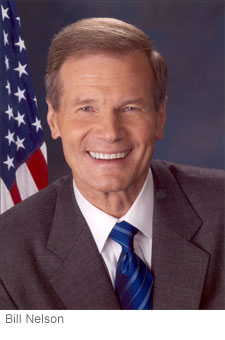 Nelson’s request, in a letter Tuesday, cited a report by University of South Florida researchers who have found 51 bodies buried at the former school property. He said that contrasted with an earlier state investigation that concluded 31 bodies were on the site.
Nelson’s request, in a letter Tuesday, cited a report by University of South Florida researchers who have found 51 bodies buried at the former school property. He said that contrasted with an earlier state investigation that concluded 31 bodies were on the site.
University researchers began exhumations after questions arose about whether boys suffered abuse and died at the school, with their bodies buried in unmarked graves.
“Given new information about wards of the shuttered reform school, and a long history of mistreatment allegations surrounding the Arthur G. Dozier School for Boys in Marianna, Florida, I believe the department is uniquely positioned to provide an outside and independent review,” Nelson wrote to Attorney General Eric Holder.
by The News Service of Florida
RESTORE Committee To Evaluate, Recommend Scoring For Projects
February 26, 2015
Residents and stakeholders are encouraged to attend the upcoming RESTORE Advisory Committee (RAC) meeting on March 2. The RAC will evaluate at least two scoring options for potential RESTORE projects and make a recommendation to the Escambia County Board of County Commissioners (BCC).
The first option is described as a balanced approach where the environmental, economic and infrastructure categories are weighted evenly in the scoring matrix. The other scoring option has the environmental category weighted more heavily. In both cases, results from the recent public survey were taken into consideration in developing the options, with the second option being closely representative of the public input that favored giving more weight to environmental projects.
Attendance provides an opportunity for the public to weigh in on the choices the RAC will consider. The RAC could select one of the above choices or decide on a hybrid of the two, but ultimately it’s anticipated that they will send only one recommendation to the BCC for final approval and adoption.
Those who cannot attend the meeting in person can still comment via email to RESTORE@myescambia.com.
County Job Fair In Molino, Beulah On Thursday
February 26, 2015
 The Escambia County Human Resource Department will host job opportunity fairs Thursday in Molino and in Beulah. The county is seeking to fill a total of 28 positions. These positions include Community Redevelopment Agency (CRA) workers, maintenance workers and maintenance technicians, both for summer employment and temporary positions.
The Escambia County Human Resource Department will host job opportunity fairs Thursday in Molino and in Beulah. The county is seeking to fill a total of 28 positions. These positions include Community Redevelopment Agency (CRA) workers, maintenance workers and maintenance technicians, both for summer employment and temporary positions.
The job opportunity fairs will be held:
Thursday, February 26, from 9 to 11 a.m., Molino Community Center , 6450 Highway 95-A, North, Molino
Thursday, February 26, from 1 to 3 p.m., Beulah Sr. Citizen Center, 7425 Woodside Drive, Pensacola
Cold Rain Tonight
February 25, 2015
Here is your official North Escambia area forecast:
- Wednesday Night A 50 percent chance of showers before 9pm. Cloudy, with a low around 34. North wind 5 to 10 mph.
- Thursday Mostly cloudy, with a high near 49. North wind 5 to 10 mph.
- Thursday Night Mostly cloudy, with a low around 31. Wind chill values between 25 and 30. North wind around 10 mph.
- Friday Sunny, with a high near 53. North wind 10 to 15 mph.
- Friday Night Partly cloudy, with a low around 31. North wind around 10 mph.
- Saturday Partly sunny, with a high near 58. North wind around 10 mph.
- Saturday Night Mostly cloudy, with a low around 45. East wind around 10 mph.
- Sunday A 30 percent chance of showers. Mostly cloudy, with a high near 65. Southeast wind around 10 mph.
- Sunday Night A 30 percent chance of showers. Mostly cloudy, with a low around 58.
- Monday A 30 percent chance of showers and thunderstorms. Mostly cloudy, with a high near 70.
- Monday Night A 30 percent chance of showers. Mostly cloudy, with a low around 60.
- Tuesday A 20 percent chance of showers. Mostly cloudy, with a high near 74.
Escambia Democratic Executive Committee Elects Officers
February 25, 2015
The Escambia County Democratic Executive Committee unanimously elected Mike Lowery, president of the Amalgamated Transit Union Local 1395, as their new chairman. He replaces Cassandra McAway.
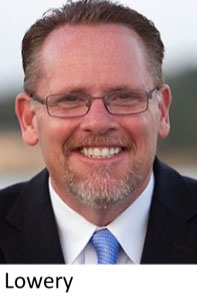 Clorissti Johnson Mitchell, who works for Aylstock, Witkin, Kreis & Overholtz, PLC, was elected vice chair.
Clorissti Johnson Mitchell, who works for Aylstock, Witkin, Kreis & Overholtz, PLC, was elected vice chair.
Deb Moore was elected secretary, and Tom Brown was elected treasurer. Member of the Escambia County DEC Steering Committee will be Dianne Krumel, Bill King, Jack Cerone, Mary Ann Andrews and past DEC Chairwoman Evalyn Narramore.
“Clorissti and I will focus on registering new voters, educating and organizing our base, and working hard to improve our local party status,” Lowery said in a press release.
The ‘Odd’ Neighbor: Cantonment Man Charged With Stalking
February 25, 2015
A Cantonment man described as an “odd” neighbor has been arrested for stalking a woman.
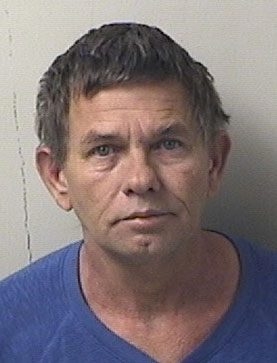 The victim told the Escambia County Sheriff’s Office that she, her husband and her young child moved into a Cantonment home just off Neal Road back in mid-December. She said that a neighbor came over the day she moved in. The neighbor, later identified as 50-year old John Matthew Fick, began asking questions about her past and told her that he had previously been charged with stalking, a confession that she found to be “odd” behavior.
The victim told the Escambia County Sheriff’s Office that she, her husband and her young child moved into a Cantonment home just off Neal Road back in mid-December. She said that a neighbor came over the day she moved in. The neighbor, later identified as 50-year old John Matthew Fick, began asking questions about her past and told her that he had previously been charged with stalking, a confession that she found to be “odd” behavior.
Fick returned the following day asking more questions, and then began dropping by the victim’s home unexpectedly at odd times, until the victim and husband instructed him to stay away, according to an arrest report. The victim said Fick began to walk around the neighborhood looking at her, which scared her.
In early February, the victim began a new job at a Cantonment store. On her first day at work, she said Fick showed up and began to follow her around the store. She told her manager, who asked Fick to leave the store. A short time later, Fick called the store, demanding to speak to a district manager to make a complaint against the victim.
The manager told deputies that Fick did enter the store and follow the victim around, but at no time did she fail to wait on him as a customer.
Over time, the victim became “increasingly scared for her life and her family’s’ lives due to the actions of Fick,” an Escambia County Sheriff’s Office report states. “Fick is clearly engaged in a course of conduct directed at her that has caused substantial emotional distress and serves no legitimate purpose.”
When questioned by deputies, Fick denied the allegations and said he just simply “sees her around the neighborhood”, and Fick claimed he has been harassed by the victim and her husband.
Fick remained in the Escambia County Jail Wednesday morning with bond set at $15,000. If he is released on bond, he’s been ordered to stay away from the victim and her family. According to court records, he was convicted in a 2013 stalking case and complete 12 months probation. He also has previous convictions on multiple drug charges in Escambia County.
Escambia To Receive Almost $3 Million In Grant Funds For Flood Repairs
February 25, 2015
Escambia County will receive nearly $3 million in grant funding to assist with seven flood repair projects after money became available in the Emergency Watershed Protection Program.
The county had previously applied unsuccessfully to the program, but funding just came available and was announced this week. The County could also be eligible for reimbursement on design costs up to 7.5% of total construction costs, or nearly $224,000.
The EWPP alleviates hazards to life and property caused by floods, fires, windstorms and other natural occurrences.
The projects covered under the grant include:
Crescent Lake, one and a half miles east of the intersection of Mobile Highway and Michigan Avenue; 600-feet north of Michigan Avenue. Stormwater toppled the 72-acre Crescent Lake embankment causing flooding downsteam. Flooding deposited sediment and debris to the side of Michigan Avenue, an arterial five-lane road and threatens to destroy 14 apartments. The grant will provide $674,531 to fix the breach in the Crescent Lake embankment and install a concrete emergency spillway. Workers will vegetate disturbed areas and remove debris and sediment from the downstream channel to Michigan Avenue to prevent flooding.
The Gatewood Ditch, south of Gatewood Drive, 400-feet south of Johnson Avenue. Eroding into a retention pond and an adjacent apartment complex. The debris and sediment from the erosion are reducing the drainage capacity and threatening to destroy downstream drainage structures and further damage Johnson Avenue. The grant will cover $350,790 of the cost to fill the eroded area and replace 1,700 feet of concrete-lined ditch. Workers will plant vegetation on the side slopes to protect from further erosion and replace the damaged retention pond outlet, stabilizing the stormwater facility outlet.
Olive Road, 1,000 feet southwest of Scenic Highway and Olive Road intersection. Erosion at the outlet of a concrete-lined waterway carved a gully adjacent to Olive Road 40-foot deep and 100-feet wide that threatens to collapse the westbound lane of Olive Road. Olive Road is a primary east-west arterial with an average daily traffic of 12,800 vehicles. The grant will provide $198,671 to install a concrete box, pipe-drop structure and a water and sediment control basin to stabilize the head of the gully and safely discharge stormwater.
Glyn Brock Gully, 200 feet north of the intersection of Johnson Avenue and Olive Road. Sediment from the Gatewood ditch and storm debris has reduced capacity in the stream channel, threatening to flood eight downstream homes on Winding Lane and five homes on Cypress Point. The grant will cover $206,657 of the cost to remove sediment and debris from the stream channel and ditch and repair the eroded area with rock riprap.
Addison Drive between Addison Drive and Scenic Highway/ Escambia Bay, 300 feet east of Ellyson Field Industrial Park. A gully is eroding into two homes on Addison Drive. The grant will provide $91,868 to remove sediment and debris from the landslide, grade and shape the slope and install a conveyance system to move water to the outlet.
The Ten Mile Creek channel is unstable and widening, threatening to collapse Pine Forest Road Bridge and erode into nine homes and eight townhouses. The grant amount for repairs is $1,377,175. Workers will stabilize the stream channel grade, address gully erosion on the channel sides and repair outlet structures.
Swamphouse Road, on the University of West Florida campus. Stream bank erosion threatens the road, utilities, the Swamphouse Restaurant and Marina. The storm tore the road in half and trees are falling into the stream channel. The grant will provide $83,440 to re-grade the side slope, plant sod and remove sediment and debris from the channel.


